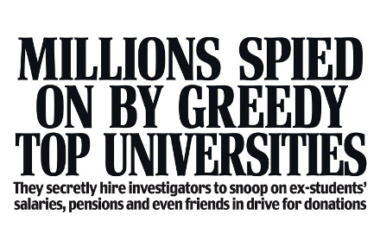The Daily Mail has accused universities of “snooping” on former students by using wealth screening firms to find information about their lives, in an investigation published on its front page today.
According to the paper the 24 Russell Group universities have used wealth screening firms, including Prospecting for Gold, Wealth Engine and Bluefrog Fundraising.
In 2015 the Mail carried out a similar investigation into some large charities’ use of wealth screening firms, which led to 13 large charities being fined because they had not done enough to make it clear to people that they data would be used in this way.
The Information Commissioner’s Office has said it will investigate the Mail’s claims and the Fundraising Regulator has issued a statement.
The Russell Group, the Institute of Fundraising and a representative body for university fundraisers, CASE, have defended universities.
‘Greedy top university’s’
The Mail said it had learned that all 24 universities which are members of the Russell Group, and include Oxford and Cambridge, had found out “sensitive information” via wealth screening firms, which includes whether alumni have donated to charities and details about their homes, pensions and investments.
It described people who have been profiled as “victims” and said the universities are “very likely to have broken the law if they wealth-screened supporters without their consent, or without them reasonably expecting that this would happen”.
The paper also described the practice of profiling alumni as “snooping”, fundraising as “aggressive” and universities as “greedy”.
As part of the investigation reporters at the Mail sent their former universities subject access requests to find out what information the university held on them. It also requested information using the Freedom of Information Act, which applies to public bodies, but not charities.
ICO to investigate
The ICO has said it will now investigate the universities to find out if any rules have been broken.
In a statement, Elizabeth Denham, information commissioner, said: “We will look carefully at the individual evidence provided by the Daily Mail to see if, and where, any rules have been broken and what learning there is for wider practice in this area.
“Personal data belongs to the individual and that means they have the right to make choices about how it's used. The law requires organisations to tell people what it’s going to be used for and who it’s going to be shared with - and that's what people expect.
“I want to be clear. Profiling individuals for a fundraising campaign itself is not against the law, but failing to clearly tell people that you’re going to do it, is.”
“We have been working with the Fundraising Regulator and talking to universities about their responsibilities around transparency and accountability as they prepare to comply with a new, stronger data protection law coming into force in May next year.
“We have offered to help universities better comply with the rules by working with them on guidelines and codes of practice they can adhere to, so people can continue to have confidence that their information is being used in line with the law.”
Fundraising Regulator statement
The Russell Group universities in England and Wales are signed up to the Fundraising Regulator. Some universities on the list are exempt charities, some are registered with OSCR, the Scottish Charity Regulator and others are registered with the Charity Commission.
A spokesman for the Fundraising Regulator, said: “Universities have a responsibility to maintain public trust. This includes obeying a legal duty to inform someone if their personal data is being processed, and to respect the rights of individuals who do not want their data to be used for direct marketing or fundraising.
“New laws coming into force next May, the General Data Protection Regulation, give individuals new rights over how their personal information is used so universities and charities must review how they use personal data. The Fundraising Regulator is committed to helping them prepare for this challenge, and many are already making positive changes.”
The Fundraising Regulator also reminded people that they can block communications from named charities and universities by using the Fundraising Preference Service.
Russell Group statement
A Russell Group spokesman defended the universities and said: “The generosity of alumni helps fund everything from bursaries for disadvantaged students to new academic facilities which benefit students directly. From cancer therapies to conflict resolution, alumni donations have helped our universities invest in cutting-edge research that is changing the world for the better.
“Philanthropy is helping widen access to higher education and improve the learning experience universities are able to provide for students.
“All Russell Group universities in England and Wales are registered with the Fundraising Regulator and when there are changes in guidance on best practice they will follow these closely. Our members are hugely grateful for the ongoing commitment to higher education shown by so many Russell Group alumni and take their privacy very seriously.”
IoF: ‘Research improves donor experience’
The IoF said that researching potential donors led to a better experience for donors.
Daniel Fluskey, head of policy, said: “Research like this is a needed and increasingly important part of fundraising for universities and charities. It is important because it gives donors an ever better experience of giving, as well helping organisations to raise money in a more efficient way.
“Time and again, evidence shows that individuals want and expect that fundraisers have an understanding about them and so are able to ask for their support in the right way, tailored to their interests and ability to donate. This is particularly the case for those who choose to give large amounts to the causes they care about. The only way that this sort of excellent fundraising is possible is through research.
“At this time of increased need, the IoF welcomes discussions about how to best develop relationships with supporters, at the same time as ensuring that data protection regulations are followed in both the letter and spirit of these rules.”
CASE: 'many alumni want to be contacted'
Tricia King, vice president global engagement, Council for Advancement and Support of Education (CASE) which works with universities on fundraising best practice said: “Last year UK universities raised over £1bn in philanthropic income in support of their core activities of education and research. This money supports many things including support for students from disadvantaged backgrounds to crucial life changing research.
“As an important part of the university community, it’s very clear that many alumni are proud to support the work of their former institution and want to be contacted.
“CASE works with universities in over 82 countries and, in the UK we see a sector that is continually looking to maintain and develop its strong and ethical fundraising practice.
“In our experience universities take the privacy of their alumni and other philanthropists very seriously. We provide platforms for fundraising experts including the Fundraising Regulator and the Information Commissioner’s Office to make sure universities are kept up-to-date with best practice.
“The Daily Mail investigation of university fundraising suggests universities may be not doing enough to explain how personal data is used and in what context. CASE was pleased to hear that the Information Commissioner's Office (ICO) has confirmed that it believes ‘profiling individuals for a fundraising campaign itself is not against the law, but failing to clearly tell people that you’re going to do it, is.’ CASE will continue to work with them and the Fundraising Regulator to improve university fundraising practice and compliance.”
Related articles












